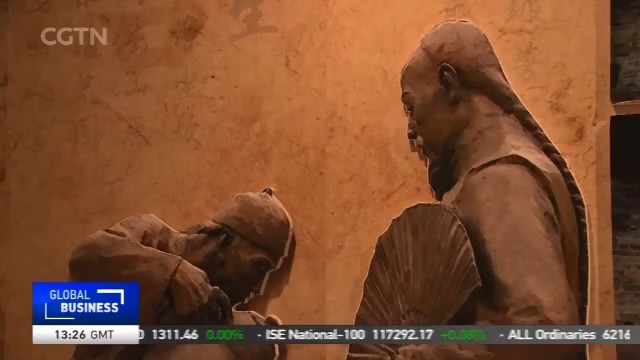
22:04, 11-May-2018
Time-Honored Brands: Expert: Key to survival lies in innovation
02:51

Lao zihao, or "time-honored brand", is a coveted title given to brands with a long history. But many of those brands are now struggling to survive in the modern market. So, how can the companies behind the brands revitalize them and attract international customers? CGTN's Cui Hui'ao finds out on a visit to one time-honored brand in Guangzhou.
Drinking herbal tea is a long-time tradition here in Guangzhou, mostly due to the city's moist and hot weather. Cooked through boiling Chinese herbal medicine, herbal tea helps relieve body heat and humidity. A wisdom handed down from ancestors centuries ago, herbal tea has become popular nationwide. "Wanglaoji" is the best-known local brand, dating back to 1828.
WENG SHAOQUAN, GENERAL MANAGER GUANGZHOU WANGLAOJI GREAT HEALTH INDUSTRY CO., LTD. "200 years ago people boiled tea at home. Years later we sold it at tea booths. Now herbal tea is sold in cans. The flavor has also evolved from bitter to lightly sweet to meet consumers taste."
This year alone, Wanglaoji has opened four new stores in Guangzhou. Pop culture elements are now incorporated into the packaging design. Some even buy it from e-commerce platforms like JD.com. However, such success for an old Chinese brand that retains its popularity still today, is quite rare.
CUI HUI'AO GUANGZHOU "There are around 1,200 so-called 'China time-honored brands' designated by the Ministry of Commerce, but only a handful of them are operating in good conditions. One expert says a lack of innovation is the main reason for their decline."
WANG HAIZHONG, PROFESSOR OF BRANDING AND MARKETING SUN YAT-SEN BUSINESS SCHOOL "Many time-honored brands fail to change with customer trends, especially those of the young generation. And marketing-wise, few have adopted new sales channels and communications strategies."
But why should it matter whether these time-honored brands survive or die? Wang says they represent the essence of China's business civilization, therefore should be protected. Furthermore, some of them have core identities, which helps them gain international recognition. The key, Wang says, is to think beyond "exporting" your products.
WANG HAIZHONG, PROFESSOR OF BRANDING AND MARKETING SUN YAT-SEN BUSINESS SCHOOL "First, you need to keep innovating your product. Secondly, try to solve problems for international customers, meeting their demands. Thirdly, set up branches overseas, hire locals to market your product, and create public good for their society."
Having already penetrated Southeast Asian and American markets, Wanglaoji has the ambition of becoming China's Coca-cola. On that note, Professor Wang believes the country's cultural influence will be the crucial factor. He says China should continue to build its soft power as it nurtures more globally influential brands. Cui Hui'ao, CGTN, Guangzhou.

SITEMAP
Copyright © 2018 CGTN. Beijing ICP prepared NO.16065310-3
Copyright © 2018 CGTN. Beijing ICP prepared NO.16065310-3